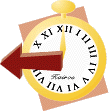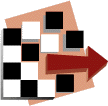





ISSN applied for
Sponsored by
The Alliance for Computers and Writing
EDITOR
Mick Doherty
MANAGING EDITOR
Michael J. Salvo
ASSOCIATE EDITOR
Amelia DeLoach
PRODUCTION MANAGER
Jason Cranford Teague
COVERWEB EDITOR
Douglas Eyman
SECTIONS EDITOR
Claudine Keenan
LINKS EDITOR
Greg Siering
COPY STAFF:
Karen Chauss
Kelli Cargyle Cook
David Dayton
Sandye Thompson
|
This site is best viewed using
an HTML 3.0 capable Browser


 LOGGING ON
LOGGING ON
Defensio tabularum:
A Defense of Archiving Writing
Created for Webbed Environments
Dene Grigar, Texas Woman's University
|
So Ya Wanna Be An Editorial Boarder ...?
How Webtexts Travel from Submission to Publication in Kairos
(Sometimes)
Nick Carbone, University of Massachusetts and Marlboro State College
|
Frames in Action
From the new book
How to Program HTML Frames: Interface Design and JavaScript
Jason Teague, Kairos Production Manager
|
Changes in Kairos 2.1
An overview of the changes in the production and presentation of Kairos
Compiled by Greg Siering and Mick Doherty |

 COVER
COVER
Tenure and Technology: New Values, New Guidelines
Coordinated by Seth Katz, Janice Walker, and Janet Cross
In the hypertexts that make up this CoverWeb, each author examines some of the possibilites for enacting change in the ways work with technology is evaluated. The hypertexts look at the issues of where, when and how that change can come about; and they look at what we know about changes that have already occurred in how online
academic work is valued and evaluated.
|

 FEATURES
FEATURES
Rhetorics of the Web:
Implications for Teachers of Literacy
Doug Brent, University of Calgary
This web calls upon theories of hypertext design, rhetorical theory, genre theory and the theory of transformative technology to explore some possible answers to
questions like "What are the forms of rhetorical hypertext?" and "What functions can be best served by which form?" and explores possibilities for hypertext as a reading and writing tool in the classroom.
|
Collaborative Spaces and Education
Daniel Anderson, University of Texas at Austin
Joi Lynne Chevalier, University of Texas at Austin
This webtext promotes distributed learning and collaboration
by taking a close look at teaching with the Internet, presenting assignments and surveying student and teacher projects. The text is open to reader contributions,
and as such, the authors call it "akin to propping open our classroom doors."
|
Embedded Visuals: Student Design in Web Spaces
Tonya Browning, University of Texas at Austin
This website is intended as an example of teaching and assessing aspects of
design in college composition courses. It addresses how to integrate design in a curriculum and offer students guidelines for design and to evaluate their projects.
|
The Seven
Ages of Computer Connectivity
John F. Barber, Northwestern State University
Borrowing from the notion of a
geological "age" which denotes a period of
time during which something exists in a
state or fashion or capacity significantly
different than other periods of time, John Barber has declared "The
Seven Ages of Computer
Connectivity---The Computer Age, The
Information Age, The Shocked Age, The
Telespheral Age, The Aquarian Age, The
Transhuman Age, and The Digital Age."
|

 NEWS
NEWS
InterMOO: Jay David Bolter
How are the "new technology tools" changing our educational environment? Dean Fontenot and John Chandler discuss the impact of MOOs upon the "whole communicative experience" with Georgia Tech's renowned rhetorician of cyberspace.
|
InterMOO: Paul LeBlanc
Marlboro College President Paul LeBlanc, former SixthFloor Media guru, swaps pixels
with Claudine Keenan and Mick Doherty about "A Journey Through Computers and Writing ...
From the Inside Out and Back Again," academia, technology, administration, and the future of technorhetoric. |
What's Going On Out There?
Scott Kapel
Scott Kapel coordinates a series of updates on the world of
pedagogy and the WWW. Includes a look at Project Gutenberg,
the Epiphany Project, Composition in Cyberspace, Crossroads,
Annenberg/CPB, Netoric, Jesters, and the Hyperfiction Narrative
Workshop.
|
Astride the Divide: Third Epiphany Institute
Gail Matthews DeNatale
An unforgettable faculty development experience, the latest Epiphany Institute included some of
the finest scholars in the field, including Trent Batson, Fred Kemp, Bill Condon, Pam Takayoshi,
Dickie Selfe, Paul LeBlanc, Susan Romano, and Steve Gilbert. This report provides complete
session notes and important follow-up research and resource materials.
|
|
News Briefs
|
|
Conference Roundup
Calls for Participation
Coordinated by Collin Brooke and Claudine Keenan
|

 REVIEWS
REVIEWS
Papertexts: Wizards, Wired Women, Historians, Contrarians, Eulogizers,
and Other Online Personae
Coordinated by John F. Barber
Fourteen reviewers take turns examining and reflecting on eleven papertext
books which examine the history, present and future of the online world.
An interlinked hypertextual spin collapses the boundaries between reviewer(s)
and text(s) and invites the reader to join the conversation.
Books reviewed include Wired Women, The Gutenberg Elegies,
The Wired Neighborhood, Life on the Screen, Link/Age, The Future
Does Not Compute, CyberReader, and several others.
Contriuting Reviewers:
John F. Barber, Marcy Bauman, Nick Carbone, Joshua L. Farber,
Susan Halter, Cynthia Haynes, Lee Honeycutt, Joan Latchaw,
Susan Lewis-Wallace, Robin A. Morris, Ted Nellen, Kip Strasma,
Bob Timm, Bob Whipple.
|

 KAIROS INTERACTIVE
KAIROS INTERACTIVE
|
RESPOND TO KAIROS
net.Thread is your instant online feedback to Kairos. You can go directly
to the discussion from here, or from various points throughout the journal. Just look for the  icon as you read. icon as you read.
|

|